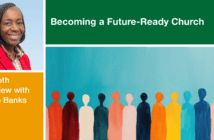Sidney Williams says that established congregations seeking to develop transformational ministries must learn to fish differently by taking full advantage of all the capital resources available to them — Faith Capital, Intellectual Capital, Social Capital, and Human Capital.
Established congregations face a climate of declining attendance, increased financial pressure, and a growing frustration with the decline in church membership. The goal is to develop transformational ministries that have a real impact on the community, exercise good stewardship, and reward the commitment to doing ministry differently. To achieve this goal, established congregations need to take full advantage of the capital resources available to them — Faith capital, Intellectual capital, Social capital, and Human capital. Congregations must learn to F.I.S.H. differently! Fishing differently requires a collaborative investment of faith, intellectual, social, and human capital, not just finding different ways to ask the same people for more money!
Faith Capital
Faith capital comprises the money and assets that communities of faith contribute to the work of ministry and upkeep of the church’s property. Generally speaking, this includes tithes and offerings that reflect a faith community’s religious conviction. Building faith capital is rooted in cultivating spiritual disciplines (e.g., prayer and fasting) and biblical literacy. Faith capital is also a vital expression of the faithful members that still regularly come to church and revel in the liturgical traditions of the church. These faithful members give, participate, and contribute gifts to the extent they can. The problem is that it is just not enough in these times when established congregations are quickly declining in numbers — even when the needs of society are greater than ever before.
When established congregations are in survival mode, there is little personal development happening. A paradigm shift is required. The faithful few must make the shift from paying their obligations to the church to investing in the work of the church. This shift is a self-emptying process that releases anxieties and deepens trust in what God is doing through the leadership of the church.
Intellectual Capital
Intellectual capital is the individual and collective knowledge, skill, experience, and expertise organized to achieve a specific goal. But many churches cannot honestly say they know the intellectual capital of their congregation because historically lay members of the congregation have been confined to limited roles within the governance and liturgy of the church. Anglican Bishop John A.T. Robinson argued that the church is in drastic need of a stripping down of its hierarchical religious system of professional clergy and restricted roles for laity, which can be an obstacle to its mission. It is this stripping down that is required for the unleashing of intellectual capital.
Appreciating the diverse personalities, skills, and experiences within the congregation and inviting them to strategically think “outside the box” about who is missing from the table builds the foundation for funding relevant and impactful ministries that are bold enough to attempt to solve some of the most difficult problems in the community. Constant communication and feedback are essential. If congregants are working hard to make recommendations but their reports sit on the desk of the pastor and other church leaders collecting dust, the process will slow to a crawl. Analysis, involvement, momentum, reporting, communication, and action are all essential elements to the success of the process.
Social Capital
Social capital is a network of relationships among institutions and people who live and work in a particular community or marketplace, enabling the community or marketplace to function effectively. Unfortunately, established congregations tend to only interact within their own neighborhood, social/political group, race, and denomination, which ignores others who might share their passion for helping those most in need. Building social capital is an invitation to pause and ask, “Who should we do ministry with?” As established congregations create plans and strategies, they need the partnership of the community — residents, government, businesses, non-profit organizations and community leaders.
According to Henri Nouwen, building social capital is always grounded in prayer and undertaken in gratitude. It is a “call conversation” for both those who seek funding and those who have funds. Whether we are asking for money or giving money, we are drawn together by God who is about to do a new thing through our collaboration. And it proclaims what we believe in such a way that we offer other people an opportunity to participate with us in our vision and mission.
Human Capital
Human capital is about the implementation of projects and programs that have relevant and demonstrable impact on human lives. Although many congregations prefer to focus primarily on the spiritual aspects of human life, they also have opportunities to develop ministries that will assist people in achieving their full potential in practical ways. It is important to understand that the marketplace is patiently waiting to fund relevant and impactful ministries that are bold enough to attempt to solve some of the most difficult problems in the community.
When fishing differently, pastors and church leaders must consider which societal problems they wish to solve. It is imperative to not lose focus on the hopes and aspirations of the congregation’s past narrative. Training and mobilizing business leaders or corporate executives in the congregation or community to form a marketplace ministry is a significant first step in making that narrative more relevant.
This article is adapted from Fishing Differently: Ministry Formation in the Marketplace by Sidney S. Williams, Jr. (Certa Publishing, 2018). The book is available at Amazon.
Related Resources
- Protect, Sustain, Grow: Best Practices For Handling Your Church’s Money Video Tool Kit
- New Possibilities are All around You by Joe Daniels And Christie Latona






